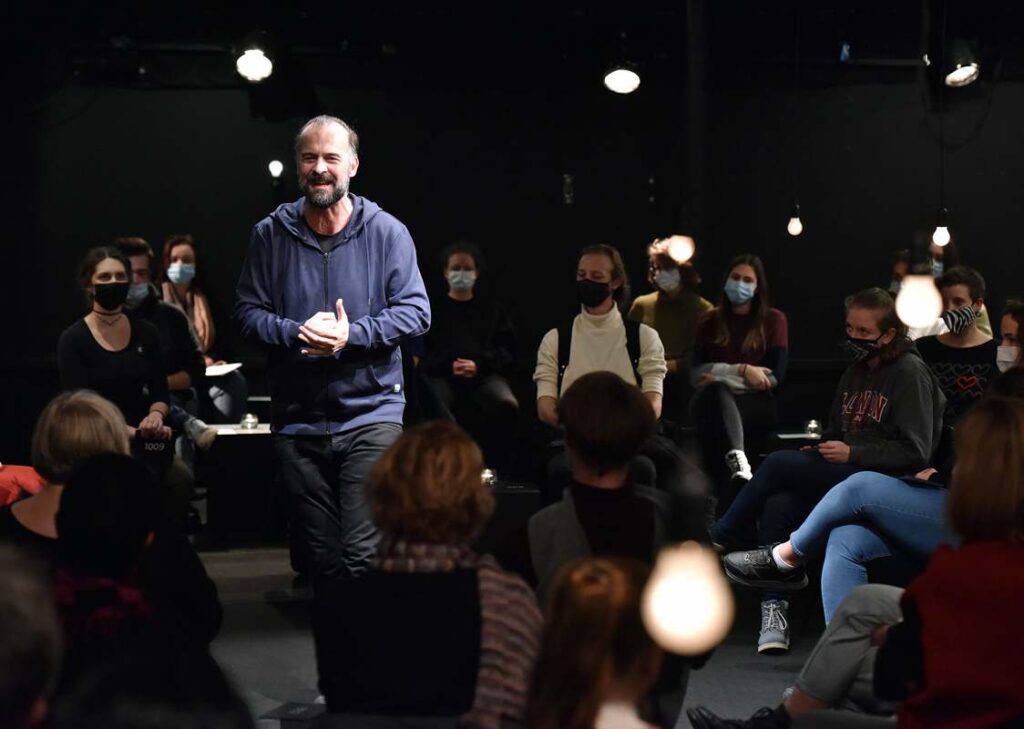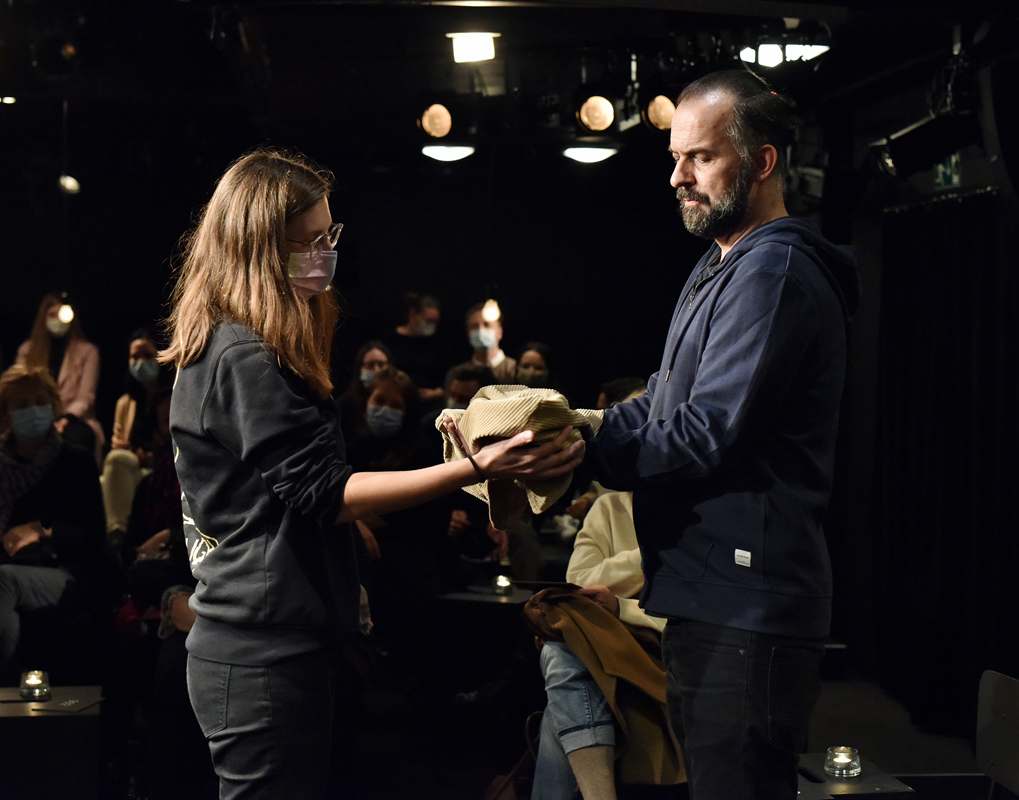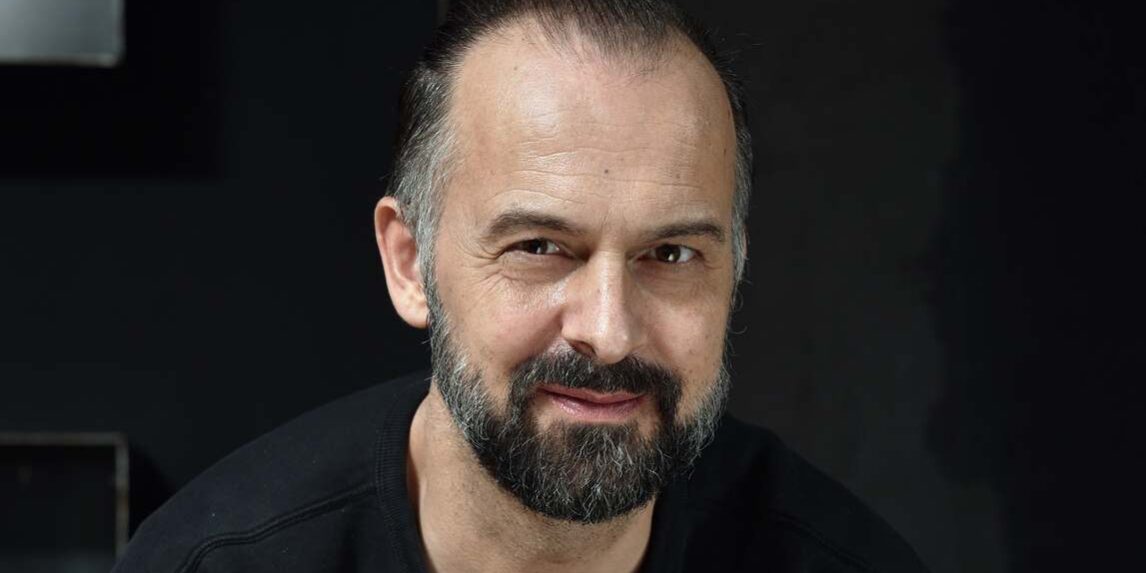Actor Uroš Fürst is the performer and translator of the Slovenian production of Every Brilliant Thing, a moving, interactive play about depression, and part of the ensemble at SNG Drama Ljubljana. He talks to Natasha Tripney about changing attitudes to mental health and why being an actor is sometimes a bit like being a gladiator.
Natasha Tripney: When did you first encounter the play and what made you want to perform it yourself?
Uroš Fürst: It was the play that found me, as it were. Before I first read it, I had been familiar with Duncan Macmillan’s play Lungs which I had seen in the Small Stage venue of the Slovenian National Theatre Drama Ljubljana before the pandemic. I was truly impressed by the playwright’s mode of narration and the actors’ performance in a staging directed by Žiga Divjak. Shortly after that, the then managing and artistic director Igor Samobor asked me to read Every Brilliant Thing. It was during my first reading that I found myself captivated by the extraordinary appeal of its form and delicate subject matter. Then I watched the HBO New York version, and it all started coming together as the most thrilling challenge of my entire acting career.
I was lucky enough to work again with the same creative team as I did exactly twenty years ago when we produced Defending the Caveman by Rob Becker which I have performed almost eight hundred times since its opening. To have the opportunity to work again with Nataša Barbara Gračner, director, and her assistant Dimitrij Gračner has proved to be the ideal platform for my version of Macmillan and Donahoe’s masterpiece.
Natasha Tripney: You also translated the text into Slovenian.
Uroš Fürst: After I had read the play, the artistic manager asked me if I would feel up to the task of translating it myself, given my knowledge and experience with English. It didn’t take me long to agree I’d do it. This seemed necessary and logical since I was to deliver the play in a very personal, intimate and informal way.
Natasha Tripney Did you make any changes to accommodate the local context?
Uroš Fürst: Interestingly enough, the script is basically devoid of any local colour, so in the end only minor changes were made, such as a few items on the list {the protagonist creates] and some other tiny details. My major challenge as a translator was to recreate the ease, clarity, and density of the content, emanating from the original. It filled me with pride to discover in my own language the capacity to achieve exactly that.
We did, however, include some pop music references from the golden era of Yugoslav socialism, but apart from that the list of songs included in the original has remained the same, and seems to function perfectly well in the context of present-day Slovenia.
Natasha Tripney: The piece requires the audience to become both performers and, for the duration of the performance, part of a community. How do you go about creating a comfortable environment to enable this?
Uroš Fürst: You can only create a comfortable environment if you feel comfortable as a performer and if you love your audience. Having said that, it’s crucially important who you work with when researching the material. This is why I found it so important to have worked with a team who provided exactly that sense of ease for me.
Natasha Tripney: How comfortable are audiences with the interactive element? What have been some of the most interesting reactions?
Uroš Fürst: I find it truly amazing how easily people relate to role-playing. As if we’re playing a children’s game on a very serious topic. It’s important that they understand it’s not about getting it right or wrong when they are exposed, and that no one will judge them and assess their “acting”, let alone make fool of them… It needs to be stressed out all the time they are entering the world of the protagonist by way of improvisation. Once they grasp it and become co-creators, their level of empathy grows exponentially. It’s all about playing, acting; without any preconceived decisions and concerns how it might turn out.
Naturally, I need to be prepared for anything, unafraid of the unexpected, and without fear that my story isn’t going in the right direction. Actually, I need to let myself be swept up by the psychodrama principle, so that I don’t control the situation and I don’t act…
When you have no fear of the unpredictable and the unknown, you can create a safe environment for everyone involved. It sounds easy enough when I’m describing it, but in actual fact it’s pretty overwhelming. I need to point out though that the script is so cogently and skilfully written that people in Slovenia (as I have experienced myself) often react almost identically as in the original script.

Vise Sijajne Stvari (Every Brilliant Thing) at SNG Ljubljana. Photo: Peter Uhan
Natasha Tripney How open are people about talking about mental health in Slovenia? Is there much stigma around discussing depression and suicide? Are there generational differences in respect to this?
Uroš Fürst: I felt a great deal of responsibility in relation to the amusing and funny aspect of the story, and was dreading I might somehow come across as insensitive and superficial, or, God beware, to offend people. During the rehearsal process, we were consulted by psychiatrist Borut Škodlar, PhD, a leading Slovenian expert in the field of suicide research and therapy. He encouraged me and instilled confidence. Personally speaking, it was the witty aspect of sorrow in the play that moved me the most.
Natasha Tripney: Do you think, having lived through two years of Covid, the piece has new resonance for audiences?
Uroš Fürst: I’m absolutely positive that the pandemic had a strong impact on most people. Personally, I had an eight-month break from acting on stage and from the audience for the first time in my twenty-year career. The very exclusivity of theatre and acting profession suddenly turned out to be terrifying. Who needs us at all, and what can we possibly give to a community? On the other hand, it has freed us from being taken for granted and made us to take stock of ourselves as artists and creators. It was just before the second lockdown in 2020 when Every Brilliant Thing was scheduled to open when all social life, due to protective national regulations and restrictions was suspended and cancelled overnight.
So Dimitrij came up with the idea that we could perform the play in the format of a Zoom show. We had a few rehearsals with the audience consisting of colleagues and friends, and I have to say that of all attempts of live-streamed theatre so common at the time in performing arts sector, this was the most reasonable and sensible one because of the level of interactivity supported by the play itself.
However, and much to my disappointment, we were refused performing rights for a Zoom production, so my capture and perfecting of a new medium with many unknown challenges was suspended.

Vise Sijajne Stvari (Every Brilliant Thing) at SNG Ljubljana. Photo: Peter Uhan
Natasha Tripney: You have been a member of the Slovenian National Theatre Drama Ljubljana ensemble since 1999. What are the advantages of being part of an ensemble for so long? Are there any drawbacks?
Uroš Fürst: To be a member of the resident ensemble of the leading theatre company in the country is a great honour and a token of recognition. On the other hand, it does entail several challenges because of the small size of the theatre market and community in Slovenia. When I discuss with my colleagues from abroad the organisation and funding of the art of theatre in Slovenia, they invariably find the concept of having a permanent contract in a national theatre, somewhat exotic.
As we all know it, acting profession is fundamentally dependent on popularity with the audience, it is, in a certain sense, gladiator-like, so residing in a ‘comfort zone’ is in contradiction with the very core of the profession. But then again, no director wants to work with actors who do not explore their limits, so in this sense, the institution of a permanent ensemble can be the very environment that challenges one as an actor. It encourages you to be constantly tried in a new personal way, so that you can remain being stimulating both by well-established directors as well as for the up-and-coming ones with fresh ideas and novel poetics. Being independent of the market and the star system is therefore a plus and a challenge too. Ultimately though, it is the audience that has the greatest power and influence over one’s career. To sum it up, in Slovenia, the legacy of self-management socialist model functions as a unique principle with its own advantages and pitfalls. The biggest advantage I have felt over the years is to be surrounded by the very best theatre makers in the country. The biggest pitfall is the complacency and routine that are virtually impossible to be avoided.
Natasha Tripney: How open are people about talking about mental health in Slovenia? Is there much stigma around discussing depression and suicide?
Uroš Fürst: I can claim with certainty that the availability of information has contributed greatly to the raising of general awareness of mental health issues in Slovenia. However, one can still come across some progressive social communities where mental distress is regarded as shameful and is no talked about or even denied.
In Slovenia, the suicide rate has always been very high and, according to my experience, hardly ever addressed in a community, and is almost a taboo. Which is precisely why Every Brilliant Thing is such an important theatrical event and experience. A lot of classic contemporary literature deals with the topic of suicide, in theatre usually behind the fourth wall, where the spectator is not directly involved. On the other hand, almost all of us have the experience of suicide in our most intimate circle.
Naturally, the coming generations, because of the changing world and of them growing up with the internet, may be getting increasingly concerned with topics that used to be a taboo, or at least unpopular, in my own time. That is why I feel that Duncan Macmillan and Jonny Donahoe’s play (and indirectly all of us who are involved in this production) is doing a great job by opening up a discussion on such a sensitive subject; it is the mission of our generation for the benefit of future generations. It’s of the utmost importance to address the issues that are the hardest to discuss. And to do it without fear.
Natasha Tripney: How did theatre artists in Slovenia fare during the pandemic? What lessons, if any, have been learned from this time?
Uroš Fürst: I think the most important lesson of the pandemic for theatre makers was to question the self-evident, taken-for-granted nature of theatre, which we were not aware of until the basic building block of theatre art – the audience – was taken away from us.
For everyone working in theatre it elicited many refreshing reflections and a new attitude towards the idea of a live event. The positive thing that we felt, and continue to do so, is that people need theatre, they yearn for live events, the simultaneous presence of spectators and creators in the same space. This is so precious and (fortunately) irreplaceable – for us on stage and for you in the auditorium alike.
For tickets and more information, visit: drama.si
Further reading: Žiga Divjak on directing Duncan Macmillan’s Lungs
Natasha Tripney is a writer, editor and critic based in London and Belgrade. She is the international editor for The Stage, the newspaper of the UK theatre industry. In 2011, she co-founded Exeunt, an online theatre magazine, which she edited until 2016. She is a contributor to the Guardian, Evening Standard, the BBC, Tortoise and Kosovo 2.0








